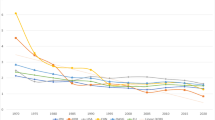Abstract
Large scale assessment of student performance is a regular feature of the international education landscape. The International Civic and Citizenship Education Study (ICCS) is a recent attempt with a focus on citizenship knowledge and skills. Student political trust data from ICCS is reported here and a mixture Rasch model is used to identify the heterogeneity in this data. The results indicate the complexity of within country and cross-country estimates of measures of political trust. The problem of relying on a single scale score to represent this complexity is underscored and the implications for citizenship education are discussed.


Similar content being viewed by others
References
Austin, E. J., Deary, I. J., & Egan, V. (2006). Individual differences in response scale use: Mixed Rasch modelling of responses to NEO-FFI items. Personality and Individual Differences, 40, 1235–1245.
Brancati, D., & Snyder, J. (2011). The Libyan rebels and electoral democracy. Foreign Affairs, 90(5). Retrieved on 18 September 2011 from http://www.foreignaffairs.com/articles/68241/dawn-brancati-and-jack-l-snyder/the-libyan-rebels-and-electoral-democracy.
De Jong, M. G., Jan Benedict, E. M. S., & Jean-Paul, F. (2007). Relaxing Measurement Invariance in Cross-National Consumer Research Using a Hierarchical IRT Model. Journal of Consumer Research, 34, 260–278.
Jamal, A., & Nooruddin, I. (2010). The democratic utility of trust: A cross-national analysis. The Journal of Politics, 72(1), 45–59.
Kennedy, K. J., Hahn, C. L., & Lee, W.-O. (2008). Constructing citizenship: Comparing the views of students in Australia, Hong Kong and the United States. Comparative Education Review, 52(1), 53–91.
Kennedy, K. J., Mok, M. M. C., & Wong, M. Y. W. (2012). Developing political trust in adolescents: Is there a role for schools? In B. Curtis (Ed.), Psychology of Trust [Series: Psychology of Emotions, Motivations and Actions]. New York: Nova Publishers.
Kirkpatrick, D. (2011). Youth plotters reveal their strategies and identities. International Herald Tribune (11 February).
Levy, B., & Fukuyama, F. (2010). Development Strategies - Integrating Governance and Growth. World Banking Policy Research Paper.
Offe, C. (1999). How can we trust our fellow citizens? In M. E. Warren (Ed.), Democracy and Trust (pp. 42–87). Cambridge: Cambridge University Press.
Read, T. R. C., & Cressie, N. A. C. (1988). Goodness-of-fit statistics for discrete multivariate data. New York: Springer.
Ringarp, J., & Rothland, M. (2010). Is the grass always greener? The effect of the PISA results on education debates in Sweden and Germany. European Educational Research Journal, 9(3), 422–430.
Rost, J. (1990). Rasch models in latent classes: an integration of two approaches to item analysis. Applied Psychological Measurement, 14, 271–282.
Rost, J. (1991). A logistic mixture distribution model for polytomous item responses. British Journal of Mathematical and Statistical Psychology, 44, 75–92.
Rutkowsi, D., & Engel, L. C. (2010). Soft power and hard measures: Large-scale assessment, citizenship and the European Union. European Educational Research Journal, 9(3), 382–396.
Schulz, W., Ainley, J., Fraillon, J., Kerr, D., & Losito, B. (2010). ICCS 2009 International Report: Civic knowledge, attitudes and engagement among lower secondary school students in thirty-eight countries. Amsterdam: IEA.
Wang, M., & Hanges, P. J. (2011). Latent class procedures: Applications to organizational research. Organizational Research Methods, 14(1), 24–31.
Warren, M. E. (Ed.). (1999). Democracy and Trust. Cambridge: Cambridge University Press.
Willse, J. T. (2009). mixRasch: Mixture Rasch Models with JMLE (Version 0.1). Retrieved from http://CRAN.R-project.org/package=mixRasch.
Willse, J. T. (2011). Mixture Rasch models with joint maximum likelihood estimation. Educational and Psychological Measurement, 71(5), 5–19.
Author information
Authors and Affiliations
Corresponding author
Additional information
The research reported here is a part of a General Research Fund Project, Asian Students’ Conceptions of Citizenship: Constructing Indigenous views of Citizens, Citizenship Education, and the State [HKIEd 842211], funded by the Hong Kong Research Grants Council.
Appendix A. The question on students’ trust on a number of civic institutions
Appendix A. The question on students’ trust on a number of civic institutions
How much do you trust each of the following groups or institutions?

Rights and permissions
About this article
Cite this article
Chow, J.K.F., Kennedy, K.J. Citizenship and Governance in the Asian Region: Insights from The International Civic and Citizenship Education Study. Public Organiz Rev 12, 299–311 (2012). https://doi.org/10.1007/s11115-012-0189-4
Published:
Issue Date:
DOI: https://doi.org/10.1007/s11115-012-0189-4




